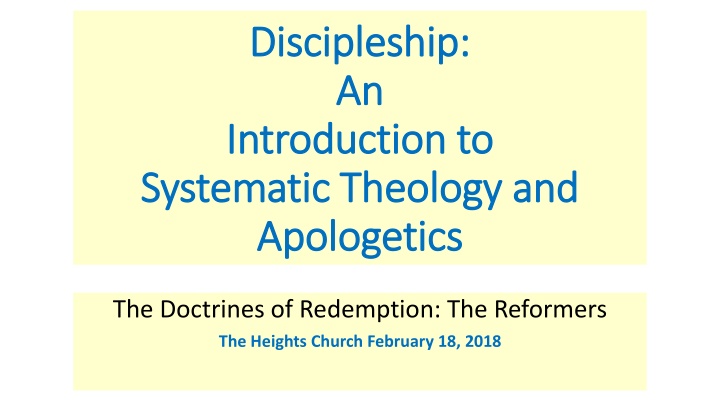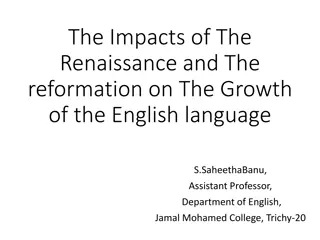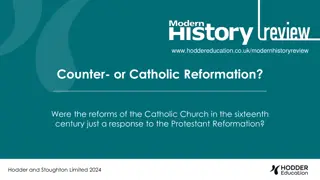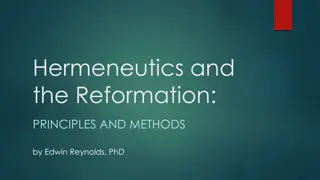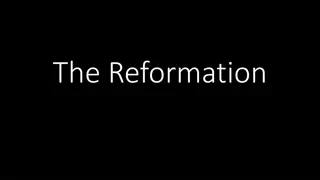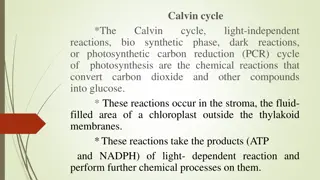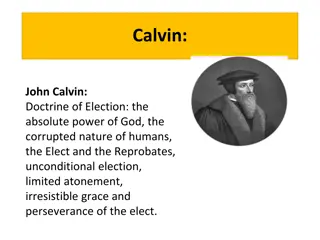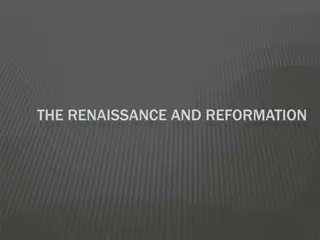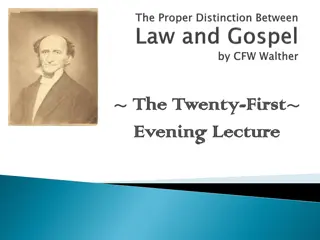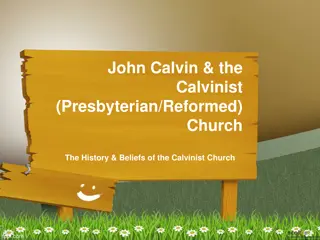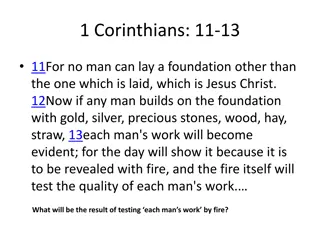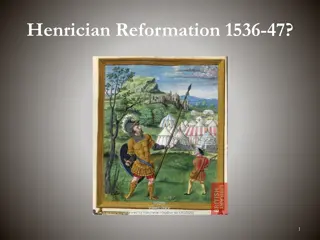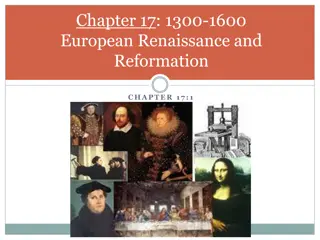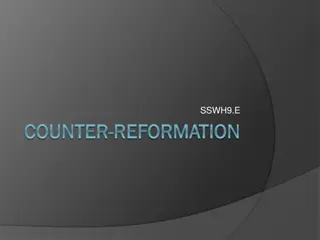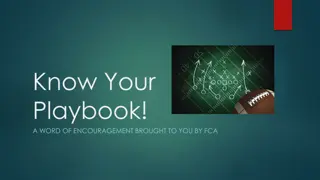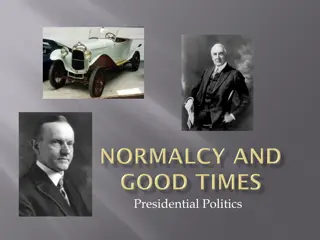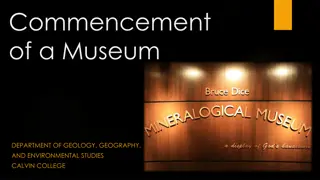The Reformation and John Calvin: A Journey of Faith and Reform
Discover the compelling story of John Calvin and the Reformation movement, from his early life to his pivotal role in reforming the Roman Catholic Church. Explore his conversion, writings, and impact on Christian theology.
Uploaded on Oct 11, 2024 | 1 Views
Download Presentation

Please find below an Image/Link to download the presentation.
The content on the website is provided AS IS for your information and personal use only. It may not be sold, licensed, or shared on other websites without obtaining consent from the author.If you encounter any issues during the download, it is possible that the publisher has removed the file from their server.
You are allowed to download the files provided on this website for personal or commercial use, subject to the condition that they are used lawfully. All files are the property of their respective owners.
The content on the website is provided AS IS for your information and personal use only. It may not be sold, licensed, or shared on other websites without obtaining consent from the author.
E N D
Presentation Transcript
Discipleship: Discipleship: An An Introduction to Introduction to Systematic Theology and Systematic Theology and Apologetics Apologetics The Doctrines of Redemption: The Reformers The Heights Church February 18, 2018
The Reformation The Reformation Calvin s Switzerland Calvin s Switzerland Paris to Geneva = 335 miles Paris to Basel = 320 miles Paris to Strasbourg = 300 miles Strasbourg Zurich Geneva to Neuchatel = 80 miles Geneva to Basel = 160 miles Basel to Strasbourg= 90 miles Basel Neuchatel Strasbourg to Wittenberg = 410 miles Bern Geneva
The Reformation The Reformation John Calvin July 10, 1509 John Calvin July 10, 1509 May 27, 1564 May 27, 1564 His prosperous father intended John along with two of his brothers to be priests. By the age of 12 he was tonsured, employed by the local bishop and began his education in Latin and philosophy. In 1525 his father decided John would make more money as a lawyer. He entered Law school where he also learned Greek. By 1532 he had received his license to practice law and written his first book. On November 1, 1533 he heard his friend Nicolas Cop deliver an address on the need to reform the Roman Catholic Church. Cop was declared a heretic and fled to Basel Switzerland. Calvin went into hiding and joined Cop in Basel in January 1535.
The Reformation The Reformation John Calvin July 10, 1509 John Calvin July 10, 1509 May 27, 1564 May 27, 1564 Late in 1533 Calvin was converted after reading Luther. His written account states: God by a sudden conversion subdued and brought my mind to a teachable frame, which was more hardened in such matters than might have been expected from one at my early period of life. Having thus received some taste and knowledge of true godliness, I was immediately inflamed with so intense a desire to make progress therein, that although I did not altogether leave off other studies, yet I pursued them with less ardour. . A second account declared: Being exceedingly alarmed at the misery into which I had fallen, and much more at that which threatened me in view of eternal death, I, duty bound, made it my first business to betake myself to your way, condemning my past life, not without groans and tears. And now, O Lord, what remains to a wretch like me, but instead of defense, earnestly to supplicate you not to judge that fearful abandonment of your Word according to its deserts, from which in your wondrous goodness you have at last delivered me. In March 1536 Calvin published the first edition of Institutes of the Christian Religion intended as an elementary manual for those who wanted to know something about the evangelical faith.
The Reformation The Reformation John Calvin July 10, 1509 John Calvin July 10, 1509 May 27, 1564 May 27, 1564 Calvin published several later editions of the Institutes. The final edition had 80 chapters compared with six in the first edition. Calvin later wrote, "I labored at the task especially for our own Frenchmen, for I saw that many were hungering and thirsting after Christ and yet that only a very few had any real knowledge of him. The Edict of Coucy issued on July 16, 1535 freed all of the jailed heretics, and offered amnesty to the heretic exiles. Calvin returned to France in 1536 to assist his brother in resolving their father s affairs following his death but decided that there was no future for him in France. In August he set off for Strasbourg, a free imperial city of the Holy Roman Empire and a refuge for reformers. Due to combat between French forces and troops of the Holy Roman Empire, he was forced to make a detour to the south, bringing him to Geneva. Calvin had intended to stay only a single night, but William Farel, a fellow French reformer residing in the city, implored him to stay and assist him in his work of reforming the church there, insisting that it was his pious duty. Calvin, who reluctantly agreed to remain, later recounted:
The Reformation The Reformation John Calvin July 10, 1509 John Calvin July 10, 1509 May 27, 1564 May 27, 1564 Then Farel, who was working with incredible zeal to promote the gospel, bent all his efforts to keep me in the city. And when he realized that I was determined to study in privacy in some obscure place, and saw that he gained nothing by entreaty, he descended to cursing, and said that God would surely curse my peace if I held back from giving help at a time of such great need. Terrified by his words, and conscious of my own timidity and cowardice, I gave up my journey and attempted to apply whatever gift I had in defense of my faith. He was given the title of "reader", which most likely meant that he could give expository lectures on the Bible. Sometime in 1537 he was selected to be a "pastor" although he never received any pastoral consecration. For the first time, the lawyer-theologian took up pastoral duties such as baptisms, weddings, and church services. January 16, 1537, Farel and Calvin presented their Articles on the Organization of the Church and its Worship at Geneva to the city council.It described how they celebrated the Eucharist, the reason for, and method of, excommunication, the requirement to subscribe to the confession of faith, the use of congregational singing in the liturgy, and the revision of marriage laws. The council accepted the document on the same day.
The Reformation The Reformation John Calvin July 10, 1509 John Calvin July 10, 1509 May 27, 1564 May 27, 1564 The council became reluctant to enforce the subscription requirement, when only a few citizens subscribed to their confession of faith. A number of political issues arose, culminating with the city of Bern s proposal to use unleavened bread for the Eucharist. Farel and Calvin were unwilling to follow Bern's lead and delayed the use of such bread until a synod in Zurich could be convened to make the final decision. The council ordered Calvin and Farel to use unleavened bread for the Easter Eucharist. In protest, they refused to administer communion during the Easter service. A riot ensued and the next day, the council told Farel and Calvin to leave Geneva. The resulting synod in Zurich placed most of the blame on Calvin for not being sympathetic enough toward the people of Geneva. It asked Bern to mediate with the aim of restoring the two ministers. The Geneva council refused to readmit the two men, who then took refuge in Basel. Farel received an invitation to lead the church in Neuch tel. Calvin was invited to lead a church of French refugees in Strasbourg by that city's leading reformer, Martin Bucer. By September 1538 Calvin had taken up his new position in Strasbourg expecting that it would be permanent; a few months later, he applied for and was granted citizenship of the city.
The Reformation The Reformation John Calvin July 10, 1509 John Calvin July 10, 1509 May 27, 1564 May 27, 1564 Calvin ministered to 400 500 members in his church. He preached or lectured every day, with two sermons on Sunday. Communion was celebrated monthly and congregational singing of the psalms was encouraged.He also worked on the second edition of the Institutes. The second edition was published in 1539. Calvin systematically presented the main doctrines from the Bible, enlarging the book from six chapters to seventeen. In March 1540 his Commentary on Romans was published. It included his own Latin translation from the Greek rather than using the Latin Vulgate. In 1540 his friends urged him to marry. Calvin wrote: I, who have the air of being so hostile to celibacy, I am still not married and do not know whether I will ever be. If I take a wife it will be because, being better freed from numerous worries, I can devote myself to the Lord. Calvin sees a wife as helpful to ministry. Paul s opinion is that a wife is a a hindrance. The unmarried man is anxious about the things of the Lord, how to please the Lord. But the married man is anxious about worldly things, how to please his wife, and his interests are divided. 1 Corinthians 7:32 - 34
The Reformation The Reformation John Calvin July 10, 1509 John Calvin July 10, 1509 May 27, 1564 May 27, 1564 Calvin reluctantly agreed to marry a young woman from a noble family if she would learn French. The wedding was planned for March 1540, but it never took place. He later wrote that he would never think of marrying her, "unless the Lord had entirely bereft me of my wits". In August 1540 he married, a widow who had two children from her first marriage. Very little is known about Calvin's personal life following his return to Geneva. His house and furniture were owned by the council. The house was big enough to accommodate his family as well as Antoine's family and some servants. On 28 July 1542, Idelette gave birth to a son, but he was born prematurely and survived only briefly. Idelette fell ill in 1545 and died on 29 March 1549. Calvin never married again. He expressed his sorrow in a letter: I have been bereaved of the best friend of my life, of one who, if it has been so ordained, would willingly have shared not only my poverty but also my death. During her life she was the faithful helper of my ministry. From her I never experienced the slightest hindrance.
